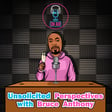
John Amos's Drama, Tina Peters Scandal, & Healing Childhood Trauma
In this episode of Unsolicited Perspectives, Bruce Anthony dives into a mix of family drama, political fallout, and personal growth. He starts by exploring the tragic passing of legendary actor John Amos, unraveling the controversy around the delayed announcement of his death and whispers of potential elder abuse.
Next, Bruce turns his attention to the political scandal of Tina Peters, the former county clerk sentenced for breaching election data. He provides a sharp critique of the dangers of blindly following political falsehoods, particularly in the Trump era.
On a more personal note, Bruce delves into the deep, lasting effects of unresolved childhood trauma, highlighting how it influences personal development, parenting, and relationships. He emphasizes the importance of therapy and confronting past issues to maintain emotional health. Bruce also shares his own experience of giving blunt advice to friends, offering listeners an engaging mix of candid insights and personal reflections. #johnamos #TinaPeters #childhoodtrauma #mentalhealth #unsolicitedperspectives
🔔 Hit that subscribe and notification button for weekly content that bridges the past to the future with passion and perspective. Thumbs up if we’re hitting the right notes! Let’s get the conversation rolling—drop a comment and let’s chat about today’s topics.
For the real deal, uncensored and all, swing by our Patreon at patreon.com/unsolicitedperspectives for exclusive episodes and more.
Thank you for tuning into Unsolicited Perspectives with Bruce Anthony. Let's continue the conversation in the comments and remember, stay engaged, stay informed, and always keep an open mind. See you in the next episode!
Chapters:
00:00 Welcome to Unsolicited Perspectives
00:57 Celebrity Losses and Family Drama
10:06 The Controversial Case of Tina Peters
18:49 Understanding Childhood Trauma
36:58 The Importance of Diverse Perspectives
37:56 Therapy vs. Public Opinion
38:55 Generational Trauma and Parenting
40:38 Impact of Childhood Trauma on Parenting
42:48 The Complexity of Emotions in Children
43:25 Overprotection and Its Consequences
47:30 Trust Issues and Parenting Challenges
50:42 Blunt Advice and Personal Stories
01:03:33 The Importance of Self-Reflection
01:04:18 Closing Remarks and Call to Action
Follow the Audio Podcast:
Apple Podcast: https://podcasts.apple.com/us/podcast/unsolicited-perspectives/id1653664166?mt=2&ls=1
Spotify: https://open.spotify.com/show/32BCYx7YltZYsW9gTe9dtd
www.unsolictedperspectives.com
Beat Provided By https://freebeats.io
Produced By White Hot
